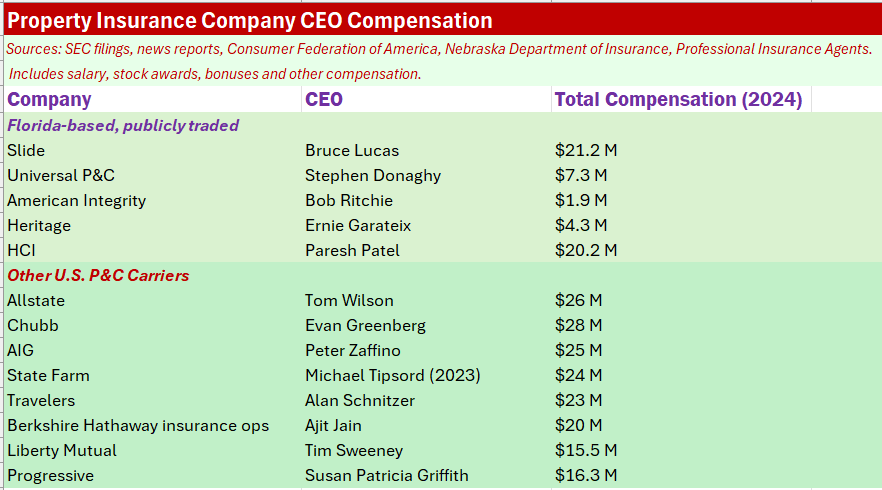When Tampa-based Slide Insurance registered for an initial public stock offering last week, one page of the filing quickly had people talking in the Florida insurance industry.
On page 132 of the filing with the U.S. Securities and Exchange Commission it shows that Slide founder and CEO Bruce Lucas in 2024 took home more than $21 million in salary, bonuses and stock awards – considerably more than CEOs at most other publicly traded, Florida-domiciled carriers. The package is not far behind the compensation levels for the heads of some of the largest insurance companies in the world, including Chubb, Allstate, AIG and Travelers.
Lucas’ wife, Shannon Lucas, the chief operating officer at Slide, was paid an additional $16.5 million, Slide’s Form S-1 filing indicates.
“Capitalism is a great system, but this is out of control,” said one Florida insurance executive who declined to be identified.

CEO Lucas, who launched Slide in 2021 after leading Heritage Insurance for eight years, has quickly built Slide from a fledgling startup to one of the larger property insurers in Florida, now with some 343,000 policies in force. But some in and out of the state say the outsized compensation package looks bad for a Florida insurance industry that’s still feeling the heat from national news reports and from policyholders hit by hefty premium increases in recent years.

“These are really shocking compensation numbers,” said Douglas Heller, director of insurance for the Consumer Federation of America. “What is the amount of money that Slide policyholders had to pay to cover this?”
Heller’s organization tracks carriers’ executive pay, based in part on insurance company reporting to the Nebraska Department of Insurance, required by a 1911 state law. He noted that the Lucas pay package may be even higher than the SEC filing shows. That’s because “emerging growth companies” are not required to fully explain executive compensation.
“In this prospectus we have elected to take advantage of the reduced disclosure requirements relating to executive compensation, and in the future, we may take advantage of any or all of these exemptions for so long as we remain an emerging growth company,” Slide noted in its SEC filing.
Others pointed out that the pay package is likely to climb for 2025 and beyond if Slide’s initial public offering is favorably received on Wall Street and the share price rises.
Lucas and Slide officials declined to comment to Insurance Journal due to the “quiet period” – between the IPO registration date until a month or so after stock trading begins, during which company officers are restricted from releasing new information that could affect investor decisions.
Available filings and reports show that the Lucas compensation is well above those for most, but not all, publicly traded holding companies for Florida insurers. Universal Property & Casualty Insurance’s Stephen Donaghy received about $7.3 million in total compensation, Universal’s SEC reporting shows. Ernie Garateix, CEO of Heritage Insurance, reported $4.3 million. Bob Ritchie, head of American Integrity Insurance, which also filed for an IPO this year, took home less than $2 million in 2024.
The CEO of one other publicly traded Florida carrier was paid almost as much as Lucas – at least on paper. Paresh Patel, head of Tampa-headquartered HCI Group, which includes Homeowners Choice and two other insurers, received total compensation of $20.2 million in salary, stock and bonuses, according to HCI’s SEC filing.
Patel said it’s all an illusion. He won’t actually see such rewards unless and until the HCI stock price tops $200 per share, then the bonus will be paid in installments over the next few years. As of last week, HCI’s share price appeared to be on its way to that goal, closing Friday at $169, up from $96 a year ago.
Patel said that the conditional arrangement was part of a package designed to keep him at the helm for the next few years after some investors feared he might retire this year at age 61. Patel, whose 2024 payout was six times what he saw 2023, said he is unlikely to receive that level of compensation again.

It’s possible that Lucas’ pay package is predicated on similar conditions. The Slide S-1 filing notes that Lucas’ total compensation for 2024 is more than double that for the previous year. But it also suggests that his $14.4 million bonus is for his work in both years. Lucas and his wife also are on the Slide board of directors but did not receive any additional compensation for those roles, the filing shows. The bonuses are designed to incentivize executive officers and are based on performance measures, the filing explains.
And COO Shannon Lucas agreed to accept a reduced salary “more in line with comparable executives in the industry,” in exchange for one-time bonus of $10 million.
To be sure, Slide has grown steadily and profitably since its birth, fueled in part by takeouts of policies from Florida’s state-created Citizens Property Insurance Corp., and by assumptions of policies from two insolvent carriers in recent years. Slide saw a profit of $201 million in 2024, almost double its net income for 2023, its SEC reporting shows. That profit could top $300 million this year if the net income for the first quarter of 2025 is any indication.
Patel said he did not know the details of the Lucas compensation plan. But he argued that Lucas and Slide should be given credit for entering the Florida market at a risky time and serving policyholders who have faced nonrenewals and spiking premiums in the litigation- and storm-plagued state.
“Florida is actually getting what it wanted, which is a very competitive insurance market,” Patel said. “Which is the best formula for driving down costs and everything else. But you also get other noise on the way.”

Heller, of the Consumer Federation, argued that Slide’s compensation package is more generous than those for executives of the largest and most competitive insurance companies on the planet. Allstate CEO Tom Wilson was rewarded with a compensation package of $26 million in 2024. The State Farm Insurance CEO took home some $24 million last year.
Critics of the Consumer Federation’s regular postings about CEO pay have argued that the CEO packages constitute a fraction of the revenue produced by big insurers. Allstate and State Farm both reported more than $4 billion in net income in 2024, Heller said.
“It may be a drop in the bucket, but it’s still greed,” Heller said. “And for Slide, it’s not just a drop in the bucket. This is not just a footnote on policyholder premium.”
Slide’s S-1 form information notes that the compensation is paid by the holding company, not the carrier. Pay plans are not included in its rate filings, and “such compensation has no impact on rates charged by the carrier.”
Slide’s average premium per policy is about $4,073, up slightly from 2024 but down from 2023. The Florida Office of Insurance Regulation, which offers a rate comparison tool for homeowners, does not include Slide in the 16 companies that it compares.
Related: Slide Insurance Files for Initial Public Stock Offering
Was this article valuable?
Here are more articles you may enjoy.



 Florida Engineers: Winds Under 110 mph Simply Do Not Damage Concrete Tiles
Florida Engineers: Winds Under 110 mph Simply Do Not Damage Concrete Tiles  The $10 Trillion Fight: Modeling a US-China War Over Taiwan
The $10 Trillion Fight: Modeling a US-China War Over Taiwan  Florida Insurance Costs 14.5% Lower Than Without Reforms, Report Finds
Florida Insurance Costs 14.5% Lower Than Without Reforms, Report Finds  What Analysts Are Saying About the 2026 P/C Insurance Market
What Analysts Are Saying About the 2026 P/C Insurance Market 


